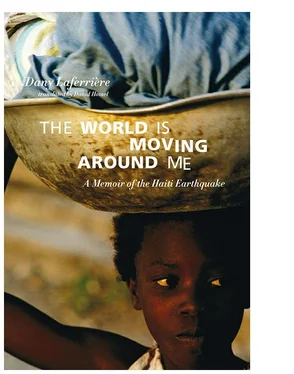Malaria
After the cemetery, we attended a small reception at a cousin’s house. The sea was right close by. In the center, under the mango trees, a dance floor where they had set up a long table covered in a white cloth. The family’s teenage girls served us. Now and again, someone took me aside discreetly to give me an account of everything that had happened in Petit-Goâve since I left in 1963. Naturally, I knew none of the names that were mentioned, but what touched me was the gravity with which these sagas were told. I didn’t know how to react, because I wasn’t sure what these people were getting at. We just want to talk to you, one of my cousins said. We don’t see you very often. At the end of the story, they shook my hand and held it, gazing into my eyes. I turned away in the face of such intensity. Calloused, peasant hands that left a smell of green leaves. City people smell like gasoline. The difference in smells separates us. We are all related in these little towns where cousins marry each other. I joined the rest of the group that was laughing as they told a story about Aunt Renée. After coffee and a last glass of rum, we went into the town, and I lingered by the harbor. The church, where I once waited on the steps for my teacher Mr Calonges, who gave me private lessons, is now a ruin. The library across the way, where I gave a talk last December, is just a memory. Not a stone standing. As I stood by the presbytery, I could see the water. On the way back, I met a young doctor working for the Red Cross. He told me in no uncertain terms that malaria had made a dramatic return to the region. Since I hadn’t taken my pills before I left on this trip, I went back to the car, and we got ready to leave. Back in 1974, I did research in Petit-Goâve and discovered that the town, surrounded by swamps, was infested with anopheles brimming over with malarial parasites. When we tried to drive off, we discovered that that car had an alternator problem. We left it in Petit-Goâve, in the care of one cousin, and set out in the car of another. That’s what funerals are: a tribe of cousins, men and women both. Total darkness on the highway. Luckily, we didn’t break down on the road. All that night, my sister was in a state of anxiety about the car. Since the earthquake, it’s important to have a car in good working order — for those who own one. She works on the other side of the city. We returned Saturday evening. On Sunday morning, a driver left early for Petit-Goâve with a second-hand alternator he’d bought. They installed it quickly so he could be back in Port-au-Prince before nightfall. My sister started smiling again. “That car is like my legs,” she sang. “Without it I couldn’t go to work. And if I don’t work, I’m dead. Dead, dead, dead.” There’s no one more alive than my sister when she’s happy.
A Body Quake
A friend invited me to a restaurant. Night was falling. We heard whispering nearby. A swarm of humans moving inside their tents. A few lamps lit. As we climbed toward Pétionville, we saw how much it had rained. We reached the place Saint-Pierre. I wondered how these people manage to sleep in the mud, night after night. Fortunately, the sun dries everything out during the day. Rainwater comes sweeping down the mountain. We went by a discotheque. Line-ups of luxury cars. People have come here to let go after all their trials. The restaurant is perched on a hill with a magnificent view of the city. I see people up there and wonder what it must be like, eating as you look out on a broken city. My friend took me to La Plantation where the fish is very good. Just before dessert, I went into the bathroom to rinse my face when my legs gave out. I grabbed onto the sink. I felt a good strong shock. My breath gone. Sweating already. I sat down on the toilet. My legs were weak. I went back to the table once I’d gotten hold of myself. The same atmosphere as before. Nothing indicated there’d been a tremor. I can’t be the only one who felt it. People are going to mention it. I just need to wait. The conversations were as lively as ever. Finally I understood that my body had shaken, not the earth.
A New Word
I’m standing on the sidewalk, waiting for my nephew to come back. Young women slip out of their tents in the camp next door. They’re dressed for Saturday night. My nephew is late, and my mother is worried. I listen to the radio that she forgot on the gallery by her chair. Actually, I’m not really listening. You can’t count the number of radio stations in Port-au-Prince. I recognize them by their decibel level. A lot of announcers think they have to scream to get the public’s attention. Their voices add to the heat. Other announcers present a more distinguished profile to charm the upper-class audiences who hate those loud, demanding voices. Really, I’m not as bothered as I let on by the cacophony of everyone shouting out his argument without even pretending to listen to anyone else. Politics is the only subject, the daily bread of those who prefer opinion to information. Despite the noise, it’s a kind of barometer. Someone has just burst into flames of wrathful anger — then I realize it’s only theater. From the inflamed discussions, I’ve picked out these words (shouted every time) that keep coming back: cracks, ruins, reconstruction, camps, tents, provisions. Will they dislodge the words from the previous generation: Aristide, les chimères , corruption, de facto government, eradication, and embargo? Or the terms from the generation before: Duvalier, dictatorship, prison, exile, tonton-macoute . Every decade has its vocabulary. The frequency of certain words in the media informs us about the state of things. For many years, the two favorite ones were “dictatorship” and “corruption.” Now, for the first time, we’re hearing “reconstruction.” That’s a new one. Even if most people can’t really believe it.
A Slight Indisposition
My mother and my sister were on the gallery. My nephew was working on his political economy homework. I was on the bed in his room. My brother-in-law was eating dinner alone with his newspaper. Suddenly, we heard a dish shatter. My nephew jumped up and discovered my brother-in-law stretched out on the table, his jaws locked. We didn’t know what to do. My sister walked calmly into the room. Her cool demeanor always scares me because I know, deep down, that she’s panicking. She threw cold water on my brother-in-law’s face. I worked to loosen the grip of his jaw as my nephew tried to slip an aspirin into his mouth. It was no use. A little sugar water was more effective. He’d felt ill suddenly, and thinking his blood pressure was too high, he took a drug to lower it. But the opposite happened. A quick drop in blood pressure threw him into a kind of coma. My mother’s face was a picture of concentration as she paced the corridor, calling upon the Virgin’s help. Once the crisis passed, my nephew started making jokes, but we knew he was afraid. We all went off to bed without any more discussion. My nephew plugged in the machine that keeps away mosquitoes. We listened to the dry buzz of grilling mosquitoes until my sister asked him to turn the thing off so we could sleep.
Frankétienne’s Strategy
I went by Frankétienne’s place yesterday. He wasn’t there. I looked around the garden. Everything seemed to be in good order, including the disorder. This morning I saw the stone-masons at work. The foreman invited me to look around; Frankétienne wanted me to, though he couldn’t be here today because he had a meeting out of town. Once a month, he meets with old friends for long discussions on a variety of subjects. In other words, he wouldn’t be back until evening. I noticed solid-looking steel poles planted here and there, better to resist the next earthquake. Frankétienne had painted them in the Basquiat style. I detected echoes of the two Haitian painters closest to him, Tiga and Saint-Brice. That’s Frankétienne in a nutshell: he sees the world as an artist does. I wouldn’t mention it to the foreman, but if you ask me, adding steel poles is not going to make the house more resistant to earthquakes. The opposite is true. But Frankétienne is a maximalist. Faced with an earthquake, the best strategy is to bend so you don’t break, but he reinforced his backbone with concrete. The next time will be a duel. But what matters most is that he’s trying to turn this disaster into a work of art.
Читать дальше












